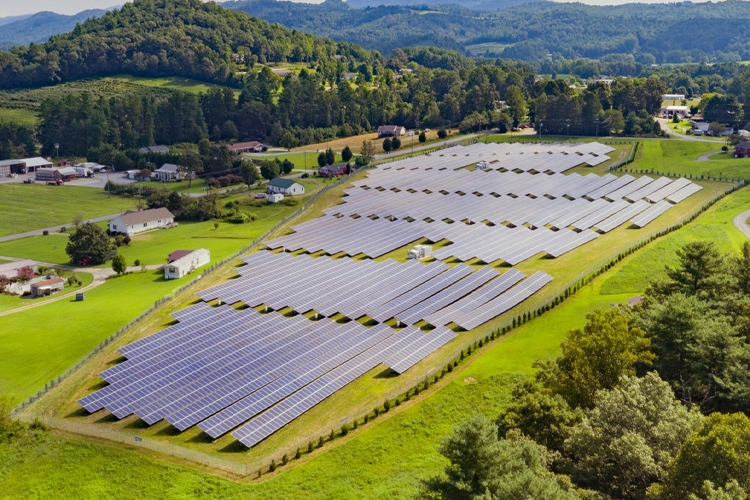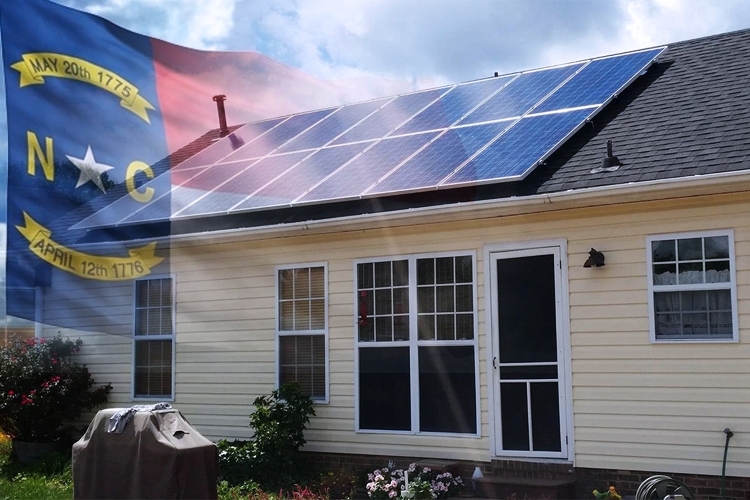North Carolina Average Solar Energy Production
When North Carolina homeowners consider investing in a solar panel system, they first want to know how much money it can save them. After all, there’s no sense in switching to something unless it helps your bottom line.
But after that, one of the secondary questions they ask is how much solar energy can be produced in a day by the solar system.
The answer can differ based on a number of factors, including the time of year, the size of your system and the amount of direct sunlight. PowerHome takes each of those one by one in explaining them.

Solar System Factors
Seasonality. In the most general terms, days are longer in the summer and shorter in winter, meaning your panels have additional time in the summer to capture daylight. How much longer are we talking about?
Using Raleigh, North Carolina, as an example, there were 14 hours and 35 minutes of daylight on the 2018 summer solstice (June 21), and there will be 9 hours and 44 minutes of daylight on the 2018 winter solstice (Dec. 21). So in the heart of the Tar Heel State, the longest day of the summer provides nearly 5 more hours of daylight to generate solar power compared to the shortest day of winter! That’s why you’ll be much more likely to see net metering credits on your electric bill during the summer months, whereas in the winter you may use more energy than you produce because of the daylight reduction.
Amount of direct sunlight. Not all daylight is created equal. Direct sunlight on clear days will always provide the most energy production from your solar panels, while rain and clouds inhibit it. Shading on your property also can inhibit production, even on those cloudless days.
Size of your system. Put simply, the more panels you have, the more sunlight they can capture and the more energy you can produce. In looking at 12 months of your power usage, we’re able to estimate how many panels you need to offset the amount of total electricity you’re seeking.
So how do I choose the number of solar panels?
There are a few key things to think about when you're choosing the right number of solar panels:
- Electricity demand. First, you need to figure out how much electricity you'll need. Then, estimate your average daily usage based on that number.
- Geographic location. Where you are also makes a difference. Different areas get different amounts of solar radiation, which affects how well solar panels work at generating electricity. On average, about 4.5 kWh/kW of solar power is produced daily in North Carolina.
- System efficiency. How well a solar system works depends not only on the solar panels, but also on how efficient the off-grid inverter, batteries (if used) and other components are.
- Budget. The cost of a solar energy system includes the hardware, installation, and possibly maintenance.

Here are a few tips to help you decide how many solar panels you need:
Step 1: Estimate Daily Electricity Consumption
- Take a look at your electric bill and find your average monthly usage.
- Just divide the average monthly usage by 30 (or the number of days in the month) to get the average daily usage.
Step 2: Consider System Efficiency
- Find out how much power the solar panels can produce at their maximum (usually measured in watts).
- It's also worth thinking about the system efficiency, which is usually somewhere between 75% and 90%.
Step 3: Calculate Solar Panel Requirements
- Number of solar panels required = Average daily electricity consumption (kWh) x System efficiency / Average daily output of individual solar panels (kWh/day)
- The average daily output of a single solar panel can be estimated by multiplying the maximum output power of the solar panel by the average local solar radiation (kWh/kW/day).
Step 4: Other Factors
- Think about anything that might affect how much energy the solar panels can produce. Things like shading, roof orientation, and tilt angle could make a difference.
- Think about how electricity use might change in the future. You might need to have some extra capacity ready.
Step 5: Get Help From a Professional
- It might be a good idea to get help from someone who knows about solar systems. They can give you more accurate estimates and help you figure out the best way to set up your system. The offline store PowerHome is always open to your inquiries.
Ready to start going solar and getting energy whenever and wherever you need it? Now is the perfect time! Install solar panels right away and start saving money on your electric bill and generating your own clean energy. The solar panels installed on your home are built to last, and they're expected to last well over 25 years, giving you a whole new experience.
(1).png)
(1).png)